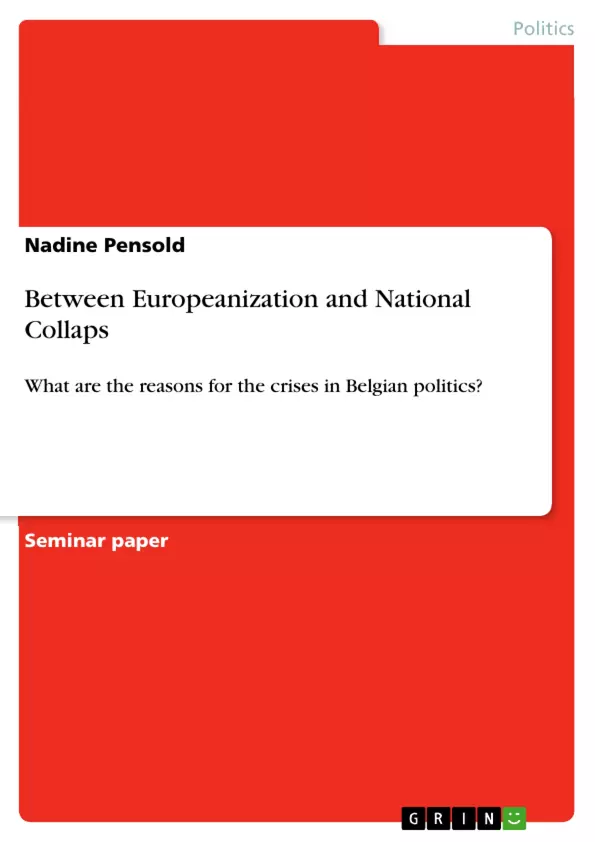Since the 1960 the situation in Belgium is embossed by a conflict between two cultural groups and recurrent political crisis. 2007 the small state in the heart of Europe was not able to find a government that argues the interest of 10 million people during almost 200 days.
Now an interim government controls the fate of Belgium until the next elections in March 2008. The future for the state seems to be very insecure: Flanders and Wallonia are the main actors in the traditional conflict known as “battle of language”. But it is more than a struggle between French and Dutch – it is a combat concerning culture, economy and politics. Two parties are trying for decades to win the fight for force and influence and have now reached the climax. This work will give an impression how Belgium got there and where it might go.
Inhaltsverzeichnis (Table of Contents)
- Abstract
- Introduction
- Indicators of the crisis
- Can we call it nation?...
- Society turned the other way round
- Four steps into a new state order.
- Parties developed and so did governance..
- Brussels between Belgian regions and European Union
- Conclusion
Zielsetzung und Themenschwerpunkte (Objectives and Key Themes)
This work analyzes the complex political situation in Belgium, specifically focusing on the long-standing conflict between the Flemish and Walloon communities. The paper aims to understand the historical and social factors that have contributed to the current political crisis, particularly the struggle for power and influence between these two groups.- The impact of Europeanization on Belgian identity and politics
- The historical and cultural differences between Flanders and Wallonia
- The role of political parties in exacerbating and attempting to resolve the conflict
- The unique position of Brussels as both a national and international center
- The potential for a future breakdown of the Belgian state
Zusammenfassung der Kapitel (Chapter Summaries)
- Abstract: This section provides a concise overview of the paper, highlighting the ongoing conflict between the Flemish and Walloon communities and the current political crisis in Belgium.
- Introduction: The introduction provides background information about Belgium's political situation, emphasizing the country's significance within the European Union and the challenges it faces due to internal conflicts. It also introduces the ongoing political crisis, outlining the events leading up to the formation of an interim government.
- Indicators of the crisis: This chapter explores the indicators of the crisis in Belgium, including the rising calls for independence, the increasing instability of the political system, and the historical context of the Flemish-Walloon conflict. It also delves into the concept of "failing states" and how it relates to the current situation in Belgium.
- Can we call it nation?: This section examines the complexities of national identity and the challenges posed by the diverse cultural groups within Belgium. It analyzes the historical development of the nation-state concept and its applicability to the Belgian situation.
- Society turned the other way round: This chapter explores the social, economic, and cultural factors that have contributed to the conflict between Flanders and Wallonia. It analyzes the historical development of these differences and their impact on the political landscape.
- Four steps into a new state order: This section outlines four steps that might lead to a new state order in Belgium. It explores the potential scenarios for the future of the Belgian state, considering the possibility of a complete breakdown or a new model of governance.
- Parties developed and so did governance: This chapter examines the role of political parties in the Belgian political landscape, particularly their influence on the development of governance structures and their involvement in the Flemish-Walloon conflict.
- Brussels between Belgian regions and European Union: This section analyzes the unique position of Brussels as both a national and international center. It explores the complex relationship between the city and the Belgian regions, as well as its role in the wider European context.
Schlüsselwörter (Keywords)
This work focuses on the political and social dynamics of Belgium, specifically examining the relationship between Europeanization, national identity, and the conflict between the Flemish and Walloon communities. Key terms include: Belgian politics, European integration, Flemish nationalism, Walloon identity, political crisis, governance structures, regionalism, and national identity.Frequently Asked Questions
What is the main cause of the political crisis in Belgium?
The crisis is rooted in a long-standing conflict between the Flemish (Dutch-speaking) and Walloon (French-speaking) communities over culture, economy, and political influence.
What happened during the 2007 Belgian government formation?
Belgium was unable to form a government for almost 200 days, leading to the installation of an interim government to manage the country's affairs.
How does Europeanization affect Belgian identity?
The paper examines whether being part of the European Union strengthens a shared Belgian identity or if regional identities are becoming more dominant as the nation-state weakens.
What is the unique role of Brussels in this conflict?
Brussels serves as both the capital of Belgium and the European Union, sitting geographically in Flanders but being predominantly French-speaking, which complicates regional negotiations.
Is Belgium considered a "failing state" in this analysis?
The work explores the indicators of state crisis and rising calls for independence, questioning whether traditional governance structures are still effective in keeping the nation together.
What are the "four steps" mentioned in the table of contents?
These refer to potential scenarios or stages that could lead to a new state order or even the complete breakdown of the Belgian state.
- Quote paper
- Nadine Pensold (Author), 2008, Between Europeanization and National Collaps, Munich, GRIN Verlag, https://www.grin.com/document/191056



